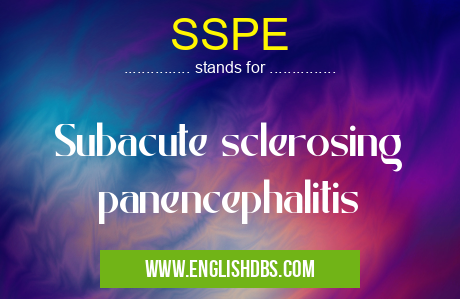What does SSPE mean in LABORATORY
Subacute sclerosing panencephalitis (SSPE) is a rare, fatal neurological disorder that affects the brain. It is caused by a persistent infection with the measles virus. SSPE typically develops several years after an initial measles infection, and it is most common in children who were infected with measles before the age of two.

SSPE meaning in Laboratory in Medical
SSPE mostly used in an acronym Laboratory in Category Medical that means Subacute sclerosing panencephalitis
Shorthand: SSPE,
Full Form: Subacute sclerosing panencephalitis
For more information of "Subacute sclerosing panencephalitis", see the section below.
» Medical » Laboratory
Symptoms
The symptoms of SSPE can vary, but they typically include:
- Progressive neurological deterioration, including difficulty with speech, movement, and coordination.
- Intellectual decline, including memory loss and confusion.
- Behavioral changes, including irritability, aggression, and hallucinations.
- Seizures.
- Muscle stiffness.
- Difficulty swallowing.
- Loss of vision or hearing.
Diagnosis
SSPE is diagnosed based on the patient's symptoms, medical history, and laboratory tests. A blood test can detect antibodies to the measles virus, and a brain biopsy can confirm the diagnosis.
Treatment
There is no cure for SSPE. Treatment is supportive and includes measures to relieve symptoms and improve the patient's quality of life. This may include:
- Anticonvulsants to control seizures.
- Muscle relaxants to reduce muscle stiffness.
- Speech therapy to help with communication.
- Physical therapy to improve movement and coordination.
- Occupational therapy to help with daily activities.
Essential Questions and Answers on Subacute sclerosing panencephalitis in "MEDICAL»LABORATORY"
What is Subacute Sclerosing Panencephalitis (SSPE)?
SSPE is a rare, fatal neurodegenerative disease that affects the central nervous system. It is caused by a mutation in the measles virus, which can remain dormant in the body for years after the initial infection.
Who is at risk of developing SSPE?
Anyone who has had measles is at risk of developing SSPE, but the risk is highest in children under the age of 2 and people with weakened immune systems.
What are the symptoms of SSPE?
The symptoms of SSPE typically develop gradually over several months and include:
- Behavioral changes
- Intellectual decline
- Muscle weakness
- Seizures
- Vision problems
- Speech difficulties
- Myoclonus (involuntary muscle jerks)
How is SSPE diagnosed?
SSPE is diagnosed based on a combination of symptoms, physical examination, and laboratory tests. These tests may include:
- Blood tests
- Spinal tap
- Electroencephalogram (EEG)
- Magnetic resonance imaging (MRI)
Is there a cure for SSPE?
There is no cure for SSPE, but treatment can help to manage the symptoms and improve quality of life. Treatment may include:
- Antiviral medications
- Anticonvulsants
- Muscle relaxants
- Speech therapy
- Physical therapy
Can SSPE be prevented?
The best way to prevent SSPE is to get vaccinated against measles. The measles vaccine is safe and effective, and it is recommended for all children.
Final Words: SSPE is a devastating disease that can have a profound impact on the patient and their family. There is no cure, but early diagnosis and treatment can help to improve the patient's quality of life.
